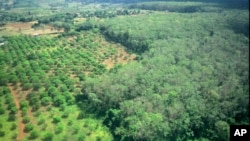The state-owned Vietnam Rubber Group has made major reforms to help people affected by its operations in Cambodia and Laos, the environmental watchdog Global Witness says.
The expansion of rubber plantations in the Cambodian countryside is a major source of contention with villagers who are ousted from their land by companies.
But VRG has improved its policies, making it possible for villagers to lodge formal complaints, and opening better communications with the communities in which it operates, the group said.
VRG can do better still, Global Witness said. “These steps fall short of addressing all of the problems with the company’s plantations,” Megan MacInnes, senior land campaigner for the group, said. “But if properly implemented, they could represent an unprecedented move by a rubber company towards delivering justice for citizens whose land and livelihoods have been taken from them.”
The rubber trade is one of the least regulated in the world, Global Witness said. “This legal vacuum is fuelling a land-grabbing crisis in Cambodia and Laos that has shown no sign of abating for half a decade.”
Last year, the group reported on Hoang Anh Gia Lai and VRG, two major rubber companies in Vietnam, were “striking deals with the Lao and Cambodian governments for huge tracts of land without first gaining permission from the people who lived on it, or compensating them for it,” Global Witness said. “VRG is a significant player in the region. According to company data, its land concessions in Cambodia cover nearly 150,000 hectares – an area almost as large as London or Manila. In Laos the company presides over almost 19,000 hectares.”
VRG is now trying community consultation programs, giving money for the loss of farmland or trees to people. The program is being put in place in 21 of its plantations in Cambodia and Laos, Global Witness said.
“The test now will be whether communities receive a fair resolution to their complaints,” MacInnes said. “This should include financial compensation as well as alternative livelihoods to those lost as a result of VRG’s operations. These new measures are a step in the right direction, but we remain deeply concerned about the continued illegal logging and land clearance taking place in and around VRG’s plantations. We will continue to watch the company closely.”







